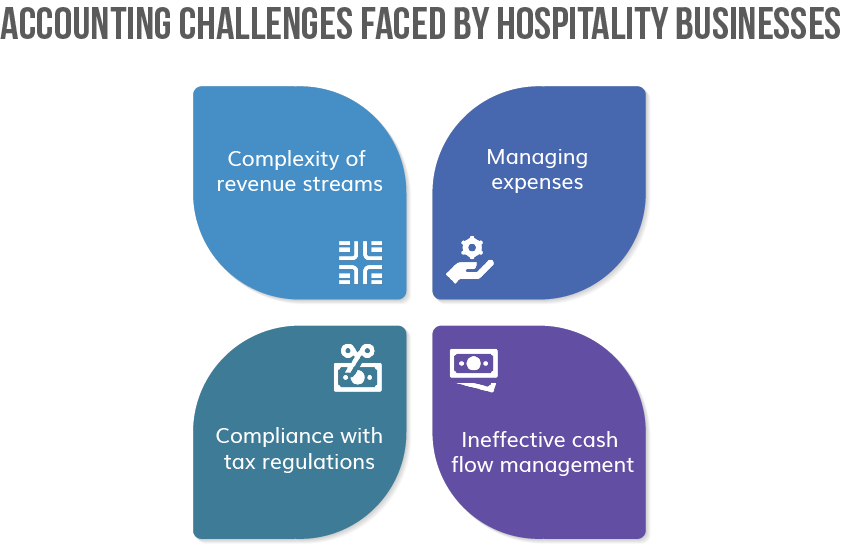Table of Content
Share This Article
- Reading Time: 6 Minutes
- Published: October 10, 2024
- Last Updated: January 21, 2025
Are you managing a hospitality business and finding it difficult to keep your finances in order? You’re not alone! Proper accounting is essential to the success of any industry, and the hospitality sector is no different. The good news is that achieving financial efficiency becomes much easier with the help of professionals. Whether you build an in-house accounting team or choose outsourced hospitality accounting services, expert guidance is key.
However, understanding the importance of accounting for your hospitality business is the first step. In this blog, we’ll explore why accounting is vital for the hospitality industry and how it can help you gain better control of your finances. Let’s elevate your business together with our comprehensive guide to accounting for hospitality industry!
Why Do Hospitality Businesses Need to Focus on Accounting?
The hospitality industry covers a wide array of businesses, from hotels and resorts to restaurants, motels, event venues, cruise lines, bars, and nightclubs, all dedicated to serving and accommodating guests. Regardless of the type of business, hospitality accounting plays a critical role in ensuring financial stability and long-term success. Accounting for hospitality industry businesses is crucial for managing cash flow, tracking expenses, and optimizing profitability. Without a solid accounting foundation, businesses in the hospitality sector can face significant financial challenges .
High operating costs often characterize the hospitality industry. Efficient accounting helps identify cost-saving opportunities, tracks expenses, and ensures that resources are used optimally. This is vital for maintaining profitability in the hospitality industry.
The hospitality sector is subject to various regulations and tax requirements. Efficient accounting ensures that the business complies with these regulations, avoids penalties, and produces accurate financial reports for stakeholders, including owners, investors, and government agencies.
Proper practices for hospitality accounting help maintain the quality of service provided to guests. By ensuring accurate billing, prompt processing of payments, and efficient management of guest accounts, a hospitality business can enhance guest satisfaction and reputation, leading to repeat business and positive reviews.
How Is Hospitality Accounting Different?
Compared to other accounting procedures, hospitality accounting is a specialist area of accounting. The distinct characteristics of the hospitality sector necessitate that accountants have a thorough comprehension of both conventional financial concepts and particulars such inventory control, occupancy rates, revenue management, and room expenses. Companies have two options for handling their accounting needs: using in-house accountants or contracting with a reputable bookkeeping and accounting firm. Due to their frequent specialization in hospitality accounting, these service providers are well-versed in handling the particular financial complexities and difficulties faced in accounting for hospitality industry.
Businesses in the hospitality industry frequently handle reservations and advance bookings. Since revenue is recognized when services are rendered rather than when payment is received, this necessitates careful revenue recognition procedures.
Inventory control is crucial to the hospitality industry’s bars and restaurants. Cost containment and product quality assurance depend on controlling inventory turnover, accounting for perishable items, and cutting waste.
A wide range of expenses are associated with the hospitality sector, such as personnel, maintenance, utilities, and the cost of food and drink. It is difficult to control these expenses, particularly in light of demand variations, seasonality, and variable pricing schemes.
Accounting Challenges Faced by Hospitality Businesses
1. Keeping Track of Revenue Streams
A notable obstacle encountered by hospitality enterprises is the intricacy of their sources of income. Revenue streams for hospitality enterprises include room rentals, food and beverage sales, event hosting fees, and more. As such, even the most well-organized accounting staff may find it difficult to keep track of all these many revenue streams.
2. Managing Expenses
Controlling costs in the hotel industry can be very challenging. Because there are so many moving components involved in running a business, from payroll to inventory management, it can be difficult for the accounting team to make sure that every expense is accurately recorded.
3. Cash Flow Issues
Effective cash flow management is another difficulty in keeping up with ongoing operating expenses while maintaining profitability. Accurate forecasting models are essential for effective budgeting in accounting for hospitality industry due to seasonal variations in revenue streams and shifting demand.
4. Tax Compliance
Another significant issue for enterprises in the hospitality industry is compliance with tax requirements. Accounting teams must invest additional time and resources in keeping abreast of constantly evolving rules, as different states may have differing tax laws or requirements for activities within their business. In this case, it’s preferable to rely on professionals offering hospitality accounting.
Effective systems for accounting for hospitality industry are essential for every successful business. Through early problem-solving and the application of suitable technology or professional guidance, they can effectively manage their finances and satisfy client demands.

Tips to Streamline Accounting for Hospitality Industry
1. Prepare Chart of Accounts
Creating an appropriate chart of accounts that is specific to your hospitality business. It is a useful suggestion to help you manage hospitality accounting. It will be simpler to correctly track spending and revenue if each department (such as food and beverage and housekeeping) has its own account.
2. Keep Records of Inventory
Don’t forget to use inventory management software to accurately record inventory in real-time. In addition to offering insightful information about ordering trends, this will aid in preventing theft or loss.
3. Track Invoicing and Payments
Keeping real-time track of invoices and payments is a major process of hospitality accounting. By doing this, you might find disparities or unpaid invoices that could affect positive cash flow soon. While reducing errors, an automated payment system will also aid in streamlining hospitality accounting.
4. Seek Professional Help
Lastly, think about working with an accounting team with experience and a focus on the hospitality sector. A skilled group can help you manage industry-specific tax laws, save expenses, and optimize earnings. You can get access to a team of experts who can help you streamline your entire accounting system by hiring professional bookkeeping and accounting services. These pointers help hospitality companies streamline their accounting procedures, which puts them in a stronger financial position and increases their chances of success in a cutthroat industry!
Final Words
It is evident from this blog that hospitality accounting plays a critical role in the industry. From comprehending expenses and pricing schemes to precisely computing taxes, efficient accounting is essential to preserving a company’s viability and competitiveness. Businesses can position themselves for long-term success and produce remarkable customer experiences by making intelligent use of this information in conjunction with other competencies required for hospitality management.

Get customized plan that supports your growth
Have questions in mind? Find answers here...
Hospitality accounting involves tracking income, expenses, labor costs, and inventory to ensure profitability. Accurate financial reporting helps hotels and restaurants maintain operational efficiency and make data-driven decisions.
Outsourced accounting can streamline financial processes for hospitality businesses by providing expert management of payroll, tax filings, and financial reporting. It ensures compliance and allows managers to focus on improving guest experiences.
Effective cash flow management in hospitality accounting is essential due to fluctuating demand and seasonal revenue changes. It helps maintain liquidity, manage expenses, and ensure smooth operations during off-peak periods.
Thousands of business owners trust Whiz to manage their account
Let us take care of your books and make this financial year a good one.








